

Written by Stephen Day
Gas Safe Engineer
Updated: 30th May, 2025
Homes will need a new boiler every 10 to 15 years to ensure they are safe and running efficiently, but this can put a lot of pressure on homeowners.
When it comes to selecting a hot water cylinder for your home heating system, you may notice that there are two different types of cylinders available: vented and unvented.
In this guide, we’ll be explaining the difference between the two to help you decide which is right for your home.
Get a free fixed price quote for a new boiler installed fast! - Find the perfect boiler!
Get a quote in 60 seconds, fitted as fast as next day!
0% APR finance available.
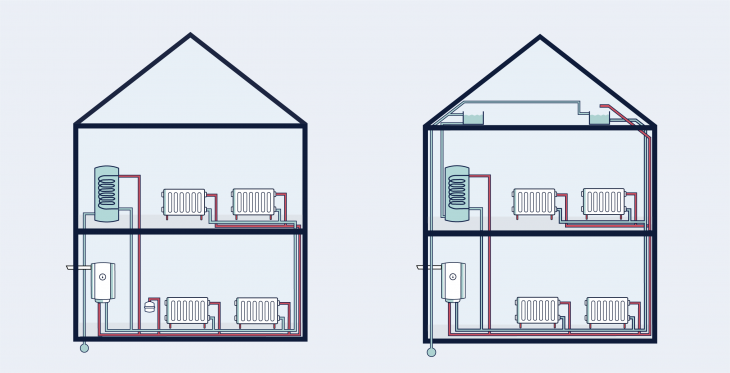
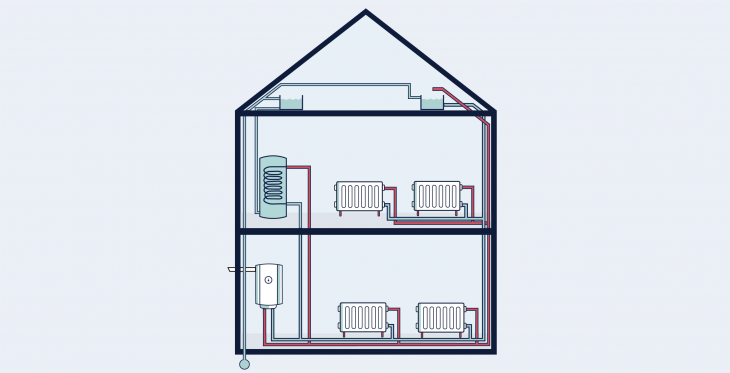
To begin with, let’s take a look at what a vented hot water cylinder is and how it fits into the heating system.
Vented hot water cylinders and tanks are the most common type of hot water systems found in UK homes. They work by feeding cold water from a header tank, which is typically located in the loft, and use gravity to drive the hot water around the home once it has been heated by the boiler.
To keep the pressure of the hot water stabilised with expansion, a vent pipe connects the vented hot water cylinder and the cold water in the header tank.
The hot water pressure is typically governed by the height of the water tank above the tap or shower feed, so although the pressure on the ground floor is excellent, the pressure in rooms on the upper floors isn’t as high.
That’s why many people have electric pumps, to increase the pressure of the hot water distributed to the showers in their homes that have vented hot water systems.
The main advantage of a vented hot water system is how simple they are to install and maintain. Not only does this make repairs and services much quicker, it also means they are significantly cheaper than unvented systems.
However, there are drawbacks too. Due to the need for a cold water tank, a large amount of space is required, so if storage space is an issue in your home, this may not be the best option for you.
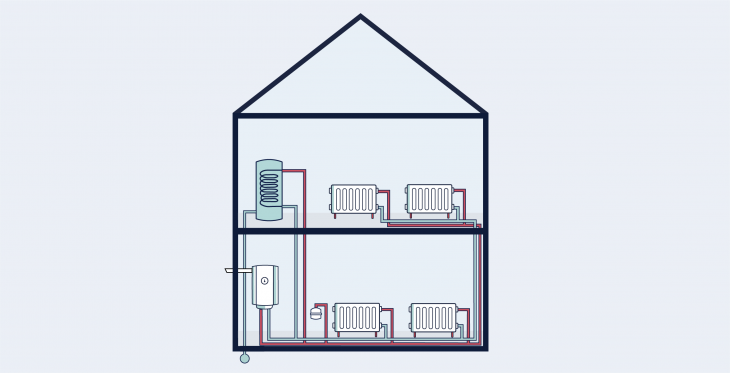
Made legal in the UK in the 1980s, unvented hot water cylinders have rapidly grown in popularity. But what are they and how do they work?
In an unvented system there is no cold water tank. Instead, the sealed hot water cylinder is fed directly from the cold water mains- and since they operate at mains pressure, this provides much better flow rates, meaning more enjoyable showers!
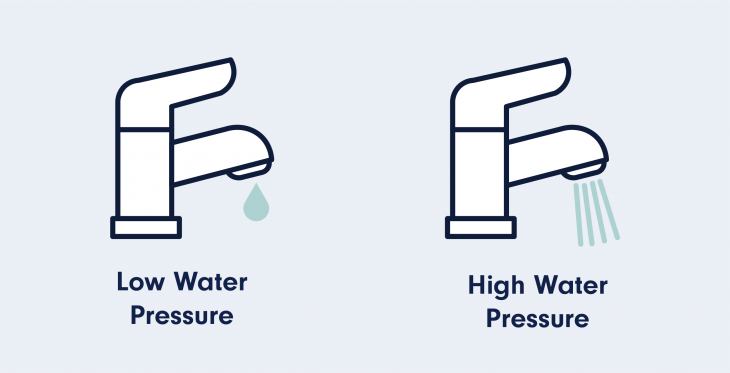
The major advantage of having an unvented cylinder compared to a vented cylinder is that there is no need for a cold water storage tank in the loft, freeing up valuable storage space in your home.
Additionally, without a cold water tank, you don’t need to worry about it freezing during the cold winter months.
Another great advantage of an unvented system is that you don’t need to rely on gravity in order to drive the hot water around your home, meaning you won’t need a pressure pump and you can install your cylinder almost anywhere in your home!
With an unvented system, you can also expect significantly less noise as there is no cold water filling the water storage cistern which can be rather loud.
Get a quote in 60 seconds, fitted as fast as next day!
0% APR finance available.
Unvented hot water systems are a lot more complex to install and maintain than vented hot water systems, so the cost of servicing and repairs can be significantly higher and more time consuming to carry out.
Are Unvented Cylinders Better?
It’s clear that unvented cylinders have far more advantages than vented cylinders, however, there are a few key factors you should consider before deciding which is best for your home.
Ultimately, the right hot water cylinder for your home comes down to your individual needs. Are you concerned about your budget and maintenance costs? Is storage space a current issue in your home?
If you’re looking to stick to a lower budget with lower maintenance costs, your best bet is probably a vented cylinder.
If space is a concern in your home, then an unvented system is undoubtedly the better option.
Can I Use a Vented Cylinder in an Unvented System?
The simple answer is no, you can’t convert a vented cylinder into an unvented cylinder. Although many parts are compatible with both types of hot water system, it isn’t advised to connect to the pressurised mains water supply without professional help from a Gas Safe engineer.
Even though converting a vented cylinder to an unvented cylinder isn’t really possible, you can pay to have your entire system upgraded from one that uses a vented cylinder and a cold water tank to one which uses an unvented cylinder- and this may even be more cost effective as part of an overall heating system upgrade in the long term.
What is the Difference Between a Direct and Indirect Unvented Hot Water Cylinder?
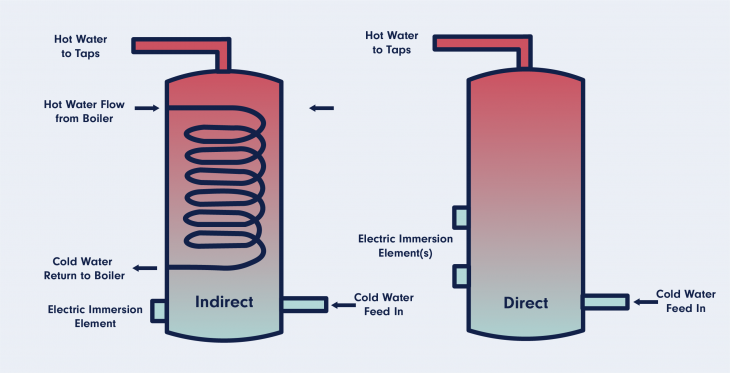
In a direct cylinder system, the hot water is heated directly by an internal element such as an immersion heater. This means the hot water is usually more expensive to produce in direct systems.
So why do some homes have them? In homes that have no access to gas, e.g. a mid-level flat, a direct system is necessary for their hot water, so they may choose to take advantage of the Economy 7 electricity meters which gives them cheaper electricity at night to heat the hot water with.
Usually, this type of cylinder is fitted with two different immersion heaters- one for the peak electricity and one for the off-peak electricity.
In this case, it’s absolutely essential to make sure the immersion heaters are set up on the timers correctly so you don’t end up overpaying for your hot water- there's no point heating water via your peak immersion heater during the night!
Most hot water cylinders are heated by an external heat source, like a gas boiler or solar thermal, where the hot water is heated and then travels through a copper coil in the hot water tank. The heat is then transferred from this to the water in the hot water tank.
Indirect cylinders typically have a direct backup like an immersion heater, so even if the boiler breaks, you are still able to produce hot water when needed.
Are you looking to upgrade your hot water system? One of the best ways to upgrade your home heating is to replace your old, inefficient boiler with a brand new A-rated efficient one from iHeat.
We stock a wide range of combi, system and conventional boilers, with options to suit every home and budget. Get a fixed quote on a new boiler plus installation today!
Last updated: 30th May, 2025

Written by Stephen Day
Gas Safe Engineer at iHeat
Stephen Day is a Gas Safe registered and FGAS certified engineer with over 20 years of hands-on experience in the heating, cooling, and renewable energy industry, specialising in boiler installations, air conditioning, and heat pump systems.
LinkedInArticles by Stephen Day are reviewed by iHeat’s technical team to ensure accuracy and reliability.

19th February, 2026
Selecting the appropriate boiler for your London home involves understanding the different...
 Read Article
Read Article

19th February, 2026
A typical Annual Boiler Service includes a visual inspection to identify any obvious fault...
 Read Article
Read Article

19th February, 2026
Boiler servicing comprises a set of inspections and tests conducted by a qualified enginee...
 Read Article
Read Article
No obligation. Takes less than 60 seconds.